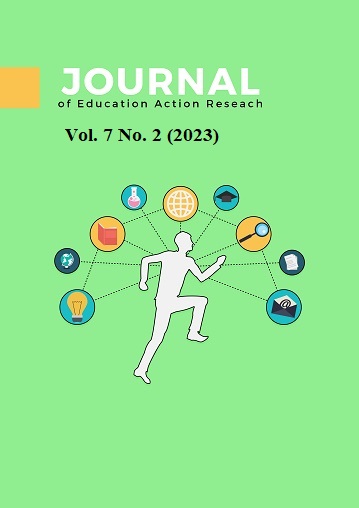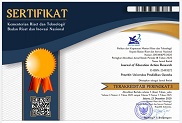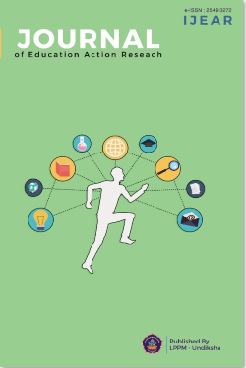Model Pembelajaran PBL Berbasis PTK-LS terhadap Penguasaan Konsep dan Keterampilan Proses Sains
DOI:
https://doi.org/10.23887/jear.v7i2.56631Keywords:
Problem Based Learning, Lesson Study, Penelitian Tindakan Kelas, Keterampilan Proses Sains, Pembelajaran BiologiAbstract
Keterampilan proses sains dan dan pengusaan konsep siswa masih perlu ditingkatkan melalui penerapan model pembelajaran inovatif yang dapat dilakukan guru secara kolaboratif. Penelitian ini bertujuan mengetahui penerapan model PBL berbasis PTK-LS terhadap aspek keterampilan proses sains dan penguasaan konsep siswa kelas X SMK Pertanian pada mata pelajaran biologi. Desain PTK menggunakan model Kemmis, Taggart & Nixon yang terdiri dari tahap perencanaan, tindakan, observasi dan refleksi. Penelitian dilaksanakan dalam 2 siklus, tiap siklus dengan 4 kali lesson study yang masing-masing terdiri dari tahap Plan, Do dan See. Metode pengumpulan data yang digunakan adalah metode non tes dan tes. Metode non tes berupa metode observasi untuk mengukur keterlaksanaan LS, keterlaksanaan sintaks PBL, dan keterampilan proses sains, metode tes uraian untuk mengukur penguasan konsep siswa. Hasil penelitian menunjukkan keterlaksanaan LS pada siklus I dan II termasuk kategori sepenuhnya terlaksana. Keterlaksanaan sintaks PBL termasuk kategori sepenuhnya terlaksana. Keterampilan proses sains siswa meningkat dari kategori tinggi pada siklus I menjadi sangat tinggi pada siklus II. Penguasaan konsep siswa juga meningkat dari kategori tinggi pada siklus I menjadi sangat tinggi pada siklus II. Simpulan penelitian penerapan model pembelajaran PBL berbasis PTK-LS meningkatkan aspek keterampilan proses sains dan penguasaan konsep siswa.
References
Ambarita, C., Simanullang, R., & Sirait, D. (2021). The Development of E-Book-Problem Based Learning Media. 1–5. https://doi.org/10.4108/eai.31-8-2021.2313720.
Amin, A. K., Sudana, I. N. D., Setyosari, P., & Djatmika, E. T. (2021). The Effectiveness of Mobile Blended Problem Based Learning on Mathematical Problem Solving. International Journal of Interactive Mobile Technologies (IJIM), 15(1), 119. https://doi.org/10.3991/ijim.v15i01.17437.
Amin, S., Utaya, S., Bachri, S., & Sumarmi, S. (2020). Effect of Problem Based Learning on Critical Thinking Skill and Enviromental Attitude. Journal for the Education of Gifted Young Scientists, 8(2), 743–755. https://doi.org/10.17478/jegys.650344.
Andaresta, N., & Rachmadiarti, F. (2021). Pengembangan e-book berbasis stem pada materi ekosistem untuk melatihkan kemampuan literasi sains siswa. BioEdu, 10(1), 635–646. https://doi.org/10.26740/bioedu.v10n3.p635-646.
Antara, I. P. P. A. (2022). Model Pembelajaran Problem Based Learning Untuk Meningkatkan Hasil Belajar Kimia Pada Pokok Bahasan Termokimia. Journal of Education Action Research, 6(1), 15–21. https://doi.org/10.23887/jear.v6i1.44292.
Astutik, S., & Prahani, B. K. (2018). The practicality and effectiveness of Collaborative Creativity Learning (CCL) model by using PhET simulation to increase students’ scientific creativity. International Journal of Instruction, 11(4), 409–424. https://doi.org/10.12973/iji.2018.11426a.
Asy’ari, M., & Fitriani, H. (2017). Literatur Reviu Keterampilan Proses Sains sebagai Dasar Pengembangan Keterampilan Berpikir Tingkat Tinggi. Jurnal Pengkajian Ilmu Dan Pembelajaran Matematika Dan IPA IKIP Mataram, 5(1), 1. https://doi.org/10.33394/j-ps.v5i1.1114.
Bosica, J., S.Pyper, J., & MacGregor, S. (2021). Incorporating problem-based learning in a secondary school mathematics preservice teacher education course. Teaching and Teacher Education, 102, 103335. https://doi.org/10.1016/j.tate.2021.103335.
Calache, L. D. D. R., Zanon, L. G., Arantes, R. F. M., Osiro, L., & Carpinetti, L. C. R. (2021). Risk prioritization based on the combination of FMEA and dual hesitant fuzzy sets method. Production, 31, 1–16. https://doi.org/10.1590/0103-6513.20200081.
Darmaji, D., Kurniawan, D. A., Suryani, A., & Lestari, A. (2018). An Identification of Physics Pre-Service Teachers’ Science Process Skills Through Science Process Skills-Based Practicum Guidebook. Jurnal Ilmiah Pendidikan Fisika Al-Biruni, 7(2), 239–245. https://doi.org/10.24042/jipfalbiruni.v7i2.2690.
Duda, H. J., Susilo, H., & Newcombe, P. (2019). Enhancing Different Ethnicity Science Process Skills: Problem-Based Learning through Practicum and Authentic Assessment. International Journal of Instruction, 12(1), 1207–1222. https://doi.org/10.29333/iji.2019.12177a.
Dupri, D., Candra, O., Candra, A., & Suryani, D. A. (2020). The Implementation of Problem Based Learning Model in Improving Cooperation and Learning Outcomes in Physical Education. Jurnal Pendidikan Jasmani Dan Olahraga, 5(1). https://doi.org/10.17509/jpjo.v5i1.22531.
Erayani, L. G. N., & Jampel., I. N. (2022). Meningkatkan Kemampuan Literasi Sains dan Kemampuan Metakognitif Siswa melalui Model Problem Based Learning Berbantuan Media Interaktif. Jurnal Penelitian Dan Pengembangan Pendidikan, 6(2), 248–258.
Gunawan, I., & Palupi, A. R. (2016). Taksonomi Bloom – Revisi Ranah Kognitif: Kerangka Landasan Untuk Pembelajaran, Pengajaran, Dan Penilaian. Premiere Educandum : Jurnal Pendidikan Dasar Dan Pembelajaran, 2(02). https://doi.org/10.25273/pe.v2i02.50.
Hastuti, P. W., Setianingsih, W., & Anjarsari, P. (2020). How to develop students’ scientific literacy through integration of local wisdom in Yogyakarta on science learning? Journal of Physics: Conference Series, 1440(1). https://doi.org/10.1088/1742-6596/1440/1/012108
Hussin, W. N. T. W., Harun, J., & Shukor, N. A. (2018). Problem Based Learning to Enhance Students Critical Thinking Skill via Online Tools. Asian Social Science, 15(1), 14. https://doi.org/10.5539/ass.v15n1p14.
IEA. (2015). TIMSS Science–Fourth Grade.
Ifnasari, I. A. (2018). Penerapan Model Problem Based Learning (PBL) untuk Meningkatkan Proses dan Hasil Belajar Muatan PPKn pada Tema 8 Subtema 1. Jurnal Penelitian Dan Pengembangan Pendidikan, 2(2). https://doi.org/10.23887/jppp.v2i2.15465.
Irwandani, Umarella, S., Rahmawati, A., Meriyati, & Susilowati, N. E. (2019). Interactive Multimedia Lectora Inspire Based on Problem Based Learning : Development in The Optical Equipment Interactive Multimedia Lectora Inspire Based on Problem Based Learning : Development in The Optical Equipment. Journal of Physics, 1155(1), 1–5. https://doi.org/10.1088/1742-6596/1155/1/012011
Karmani, K. (2021). Peningkatan Aktivitas dan Hasil Belajar Operasi Hitung Pecahan Melalui Model Pembelajaran Problem Based Learning pada Siswa Kelas V SD. Journal of Education Action Research, 5(3). https://doi.org/10.23887/jear.v5i3.34572.
Kemmis, S., McTaggart, R., & Nixon, R. (2014). A New View of Participation: Participation in Public Spheres. In The Action Research Planner. Springer Singapore, 33–49. https://doi.org/10.1007/978-981-4560-67-2_2.
Lewis, S. K., & Thompson, P. (2017). Application of Adult Learning Theory to Physician Assistant Education. Journal of Physician Assistant Education, 28(4), 196–200. https://doi.org/10.1097/JPA.0000000000000172.
Lidyawati, Gani, A., & Khaldun, I. (2017). Penerapan Model Problem Based Learning Untuk Meningkatkan hasil Belajar Dan Keterampilan Berpikir Kritis Peserta Didik Pada Materi Larutan Penyangga. Jurnal Pendidikan Sains Indonesia (Indonesian Journal of Science Education), 5(1), 140–146. https://doi.org/10.24815/jpsi.v5i1.16552.
Misla, M., & Mawardi, M. (2020). Efektifitas PBL dan Problem Solving Siswa SD Ditinjau dari Kemampuan Berpikir Kritis. Jurnal Ilmiah Sekolah Dasar, 4(1), 60. https://doi.org/10.23887/jisd.v4i1.24279.
Mukharomah, E., Hidayat, S., Handaiyani, S., & Kartika, A. (2021). Pengaruh Penerapan Model Pembelajaran Problem Based Learning (PBL) terhadap Kemampuan Kognitif Mahasiswa pada Mata Kuliah Pengetahuan Lingkungan. BIOSFER : Jurnal Biologi Dan Pendidikan Biologi, 6(1). https://doi.org/10.23969/biosfer.v6i1.3973.
Mustofa, R. F., & Hidayah, Y. R. (2020). The Effect of Problem-Based Learning on Lateral Thinking Skills. International Journal of Instruction, 13(1), 463–474. https://doi.org/10.29333/iji.2020.13130a.
Netriwati, N. (2018). Penerapan Taksonomi Bloom Revisi untuk Meningkatkan Kemampuan Pemahaman Konsep Matematis. Desimal: Jurnal Matematika, 1(3), 347–352. https://doi.org/10.24042/djm.v1i3.3238.
Novalinda, E., Kantun, S., & Widodo, J. (2018). Pengaruh Motivasi Belajar Terhadap Hasil Belajar Mata Pelajaran Akuntansi Siswa Kelas X Jurusan Akuntansi Semester Ganjil Smk Pgri 5 Jember Tahun Pelajaran 2016/2017. JURNAL PENDIDIKAN EKONOMI: Jurnal Ilmiah Ilmu Pendidikan, Ilmu Ekonomi Dan Ilmu Sosial, 11(2), 115. https://doi.org/10.19184/jpe.v11i2.6456.
Nurhayati, Wahyudi, Saputri, D. F., & Trisianawati, E. (2021). The impact of problem-based learning and inquiry models toward students’ science process skills on the vibrations and waves chapter. Journal of Physics: Conference Series, 1760(1). https://doi.org/10.1088/17426596/1760/1/012017.
OECD. (2019). Programme for International Student Assessment (PISA).
Parnayathi, I. G. A. S. (2020). Penggunaan Metode Pembelajaran Team Quiz sebagai Upaya Meningkatkan Prestasi Belajar IPA. Journal of Education Action Research, 4(4), 473–480. https://doi.org/10.23887/jear.v4i4.28642.
Rahayu, A. H., & Anggraeni, P. (2017). Analisis Profil Keterampilan Proses Sains Siswa Sekolah Dasar Di Kabupaten Sumedang. Jurnal Pendidikan Dasar Dan Humaniora, 5(2), 22–33. https://doi.org/10.24815/pear.v7i2.14753.
Sari, Y. I., Sumarmi, S., Utomo, D. H., & Astina, I. K. (2021). The Effect of Problem Based Learning on Problem Solving and Scientific Writing Skills. International Journal of Instruction, 14(2), 11–26. https://doi.org/10.29333/iji.2021.1422a.
Siahaan, K. W. A., Lumbangaol, S. T., Marbun, J., Nainggolan, A. D., Ritonga, J. M., & Barus, D. P. (2021). Pengaruh Model Pembelajaran Inkuiri Terbimbing dengan Multi Representasi terhadap Keterampilan Proses Sains dan Penguasaan Konsep IPA. Jurnal Basicedu, 5(1), 195–205. https://doi.org/10.31004/basicedu.v5i1.614.
Siswono, H. (2017). Analisis Pengaruh Keterampilan Proses Sains Terhadap Penguasaan Konsep Fisika Siswa. Momentum: Physics Education Journal, 1(2), 83. https://doi.org/10.21067/mpej.v1i2.1967.
Sudana, I., Apriyani, D., & Nurmasitah, S. (2019). Revitalization of vocational high school roadmap to encounter the 4.0 industrial revolution. Journal of Social Sciences Research, 5(2), 338–342. https://doi.org/10.32861/jssr.52.338.342.
Suhirman, S., Yusuf, Y., Muliadi, A., & Prayogi, S. (2020). The Effect of Problem-Based Learning with Character Emphasis toward Students’ Higher-Order Thinking Skills and Characters. International Journal of Emerging Technologies in Learning (IJET), 15(6), 183. https://doi.org/10.3991/ijet.v15i06.12061.
Syaiful, S., Kamid, K., Kurniawan, D. A., & Pratama, W. A. (2021). Problem-based learning model on Mathematical Analytical Thinking Ability and Science Process Skills. Al-Jabar : Jurnal Pendidikan Matematika, 12(2), 385–398. https://doi.org/10.24042/ajpm.v12i2.9744.No Title.
Wati, R. W. I., Lesmono, A. D., & Prastowo, S. H. B. (2019). Pengembangan Modul Fisika Interaktif Berbasis HOTS (High Order Thinking Skill) Untuk Meningkatkan Kemampuan Literasi Sains Siswa SMA Pada Pokok Bahasan Suhu dan Kalor. Jurnal Pembelajaran Fisika, 8(3), 202–207. https://doi.org/10.19184/jpf.v8i3.15225.
Wirta, I. M. (2021). Upaya meningkatkan prestasi belajar PPKN melalui model pembelajaran kooperatif tipe students team achievement division (STAD). Indonesian Journal of Educational Development, 1(4), 716–725. https://doi.org/10.5281/zenodo.4562076.
Yew, E. H. J., & Goh, K. (2016). Problem-Based Learning: An Overview of its Process and Impact on Learning. Health Professions Education, 2(2), 75–79. https://doi.org/10.1016/j.hpe.2016.01.004.
Downloads
Published
How to Cite
Issue
Section
License
Copyright (c) 2023 Made Dedi Agustinus, Munawir Yusuf, Subagya

This work is licensed under a Creative Commons Attribution-ShareAlike 4.0 International License.












